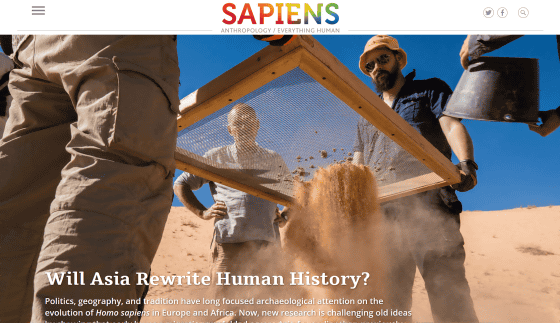'Asia', which has been overlooked for many years, may hold an important key in tracing the footsteps of Homo sapiens

Early Human Migrations Are Being Rewritten by Asia-SAPIENS
https://www.sapiens.org/archaeology/early-human-migrations/

In January 2016, a team of archaeologists and paleontologists excavating in the Saudi Arabian
In the article below, details about the 'Homo sapiens finger bones' found in the Nehd Desert are reported.
Homo sapiens finger bones 85,000 years ago are found in Saudi Arabia-GIGAZINE

Evidence that Homo sapiens reached Saudi Arabia 85,000 years ago is inconsistent with the previously advocated story of Homo sapiens migration. Homo sapiens, which was born in Africa, was thought to have left Africa about 120,000 years ago and entered the Levant , the eastern Mediterranean region of modern Syria, Lebanon, Jordan and Israel. Homo sapiens, who settled in Levant for a while, is believed to have advanced northward to Europe tens of thousands of years later, and it is estimated that the advance to Saudi Arabia to the east of Levant did not occur until about 50,000 years ago. I heard that.
In recent years, in addition to fossils found in the Nehud Desert, there are many discoveries that overturn the conventional theories regarding the movement of Homo sapiens. In 2018, Homo sapiens jaw bones, believed to be at least 177,000 years old, were discovered in Israel's Mithria Cave . Old stone tools were also found in the layer below the bone, suggesting that Homo sapiens may have advanced to Levant earlier than 177,000 years ago. Moreover, in 2015, the teeth of Homo sapiens more than 80,000 years ago were found in Hunan Province in southern China, and the accepted theory is greatly shaken.
`` We have been forced to rethink when and how Homo sapiens spread throughout the world, '' said María Martinón-Torres, an archaeologist involved in the investigation of teeth found in Hunan. The move from Africa to other regions may have taken place on multiple routes instead of one. Some evidence suggests that Homo sapiens, who left Africa, may have bypassed Levant and headed directly to Asia. 'A new story is spreading,' commented archaeologist Michael Petraglia, who was involved in the excavation in the Nehd Desert.

by S. Xing and XJ. Wu
New discoveries have changed our understanding of the time, routes, and geographic extent of Homo sapiens 'spread from Africa, but the series of discoveries is also a sign of archaeologists' blind spots. 'These findings are also big warnings about Asia,' Martinón-Torres said. 'For years, Asia has been viewed as a dead end with only a secondary role in human evolution.' I said.
Petraglia commented, 'There is a great deal of bias in what is surveyed as archeological fieldwork, and our theory of human evolution is built on these geographical biases.' Archaeologist and co-author of Archeology: A Brief Introduction , Nadia Durrani, pointed out that archeology started as a Western scientific discipline in the first place.
Early archaeologists were Christians living in Europe and the United States, and were interested in the Bible's Mediterranean coastal areas such as Iran, Iraq, Egypt, and Israel. As some discoveries were made in the area, new research institutes were established and excavations continued to progress. “In the areas where archaeological discoveries were made, understanding of archeology was deepened and funding was increased. While it is easier to provide assistance, it is also difficult to raise funds in areas where archaeological surveys have not been conducted so far.
Petraglia points out that archeological research is difficult in areas without prior research, as basic research and mapping must start in areas where preliminary research is not well underway. Archaeological research is also strongly influenced by local infrastructure and political issues. For example, Durrani participated in fieldwork in Yemen in the 1990s, and continued to investigate the remains of Yemen after that, but the work was interrupted in 2008 due to political instability. Thus political unrest and conflict are also serious barriers to archaeological research.

On the other hand, since the early 1990s, China has announced support for research in unexplored areas, and in recent years Saudi Arabia has also supported archaeological research. I am. As a result, new archaeological discoveries have sprung up in Asia in recent years, leading to a reconsideration of Homo sapiens routes and migration times from Africa.
Mina Weinstein-Evron, who was involved in the excavation of the Misya cave, pointed out that archaeologists still do not have a deep understanding of Homo sapiens. 'We don't know anything. We only have dots and dots of evidence scattered here and there, but we use big words like' migration 'and' diffusion. ' Homo sapiens says he traveled with his ticket, but they didn't know where they were heading, maybe 10km per generation, even for them It was. '
Although Homo sapiens may have exited Africa earlier, some genetic findings indicate that early Homo sapiens had failed from an evolutionary perspective. A 2016 study showed that Eurasian DNA diverged from Africans 60,000 to 80,000 years ago, and humans now living are descendants of Homo sapiens who left Africa at this time. It is suggested that it is.
Luca Pagani, a bio-anthropologist who studied DNA divergence between Eurasians and Africans, said, 'We will not change our thinking of which migration was successful, but new archaeological discoveries are due to Homo sapiens. It shows a more diverse approach to decentralization. '

Related Posts:
in Note, Posted by log1h_ik






